Report on Developing Manager Skills and Career Plan at Thomas Cook
VerifiedAdded on 2020/01/06
|12
|3803
|173
Report
AI Summary
This report focuses on the development of managerial skills within the context of Thomas Cook, a travel and tourism organization. It begins by comparing different management styles, including democratic, bureaucratic, autocratic, and laissez-faire approaches, and discusses the leadership characteristics of senior managers, such as being result-oriented, customer-focused, visionary, and strategically-focused. The report then evaluates the communication processes within the organization and analyzes the organizational culture and the change management process. A personal SWOT analysis is conducted to assess the author's own management skills, identifying strengths, weaknesses, opportunities, and threats. Finally, the report sets objectives and targets for developing the author's potential and outlines a career development plan, including the identification of managerial and personal skills for supporting career advancement.
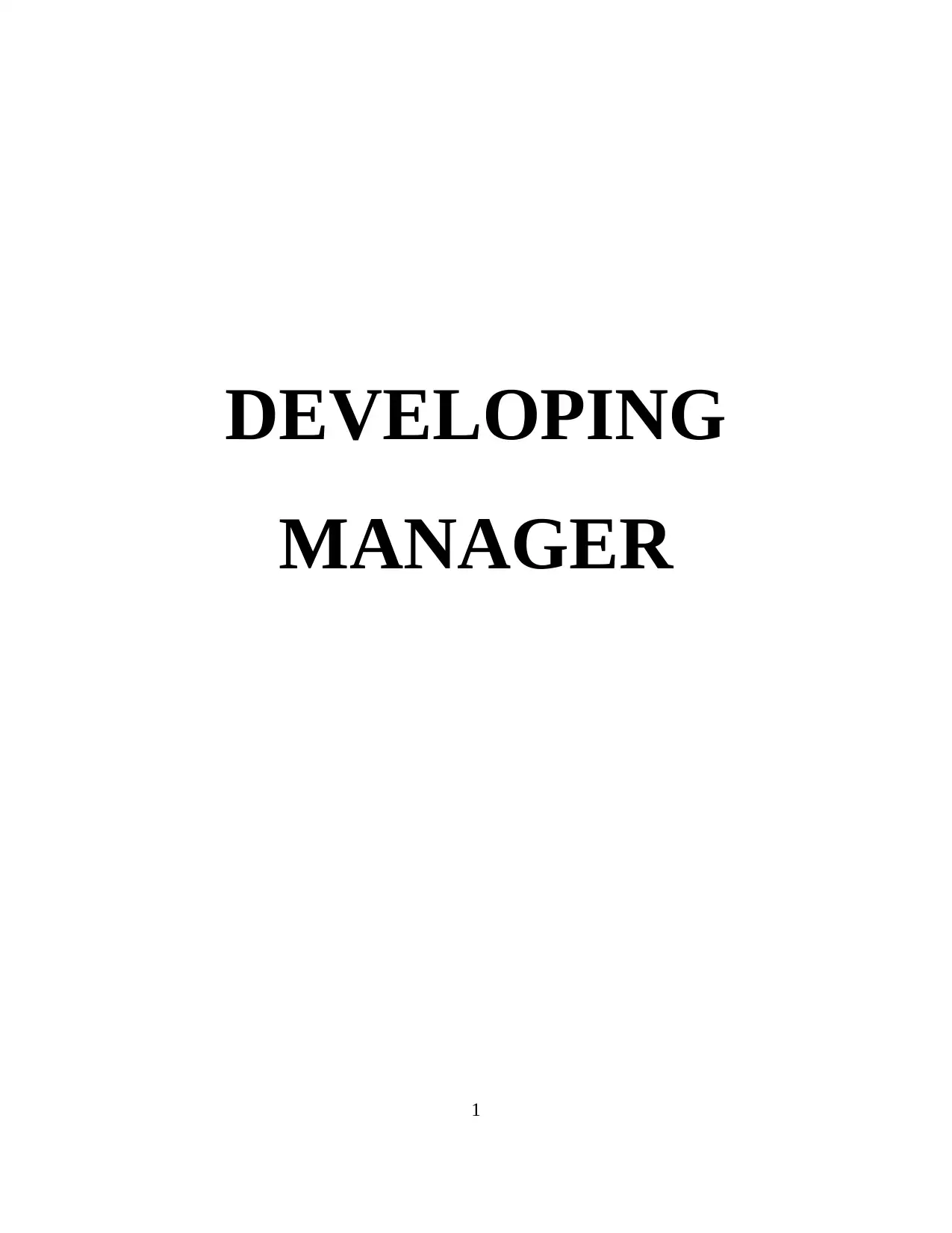
DEVELOPING
MANAGER
1
MANAGER
1
Paraphrase This Document
Need a fresh take? Get an instant paraphrase of this document with our AI Paraphraser
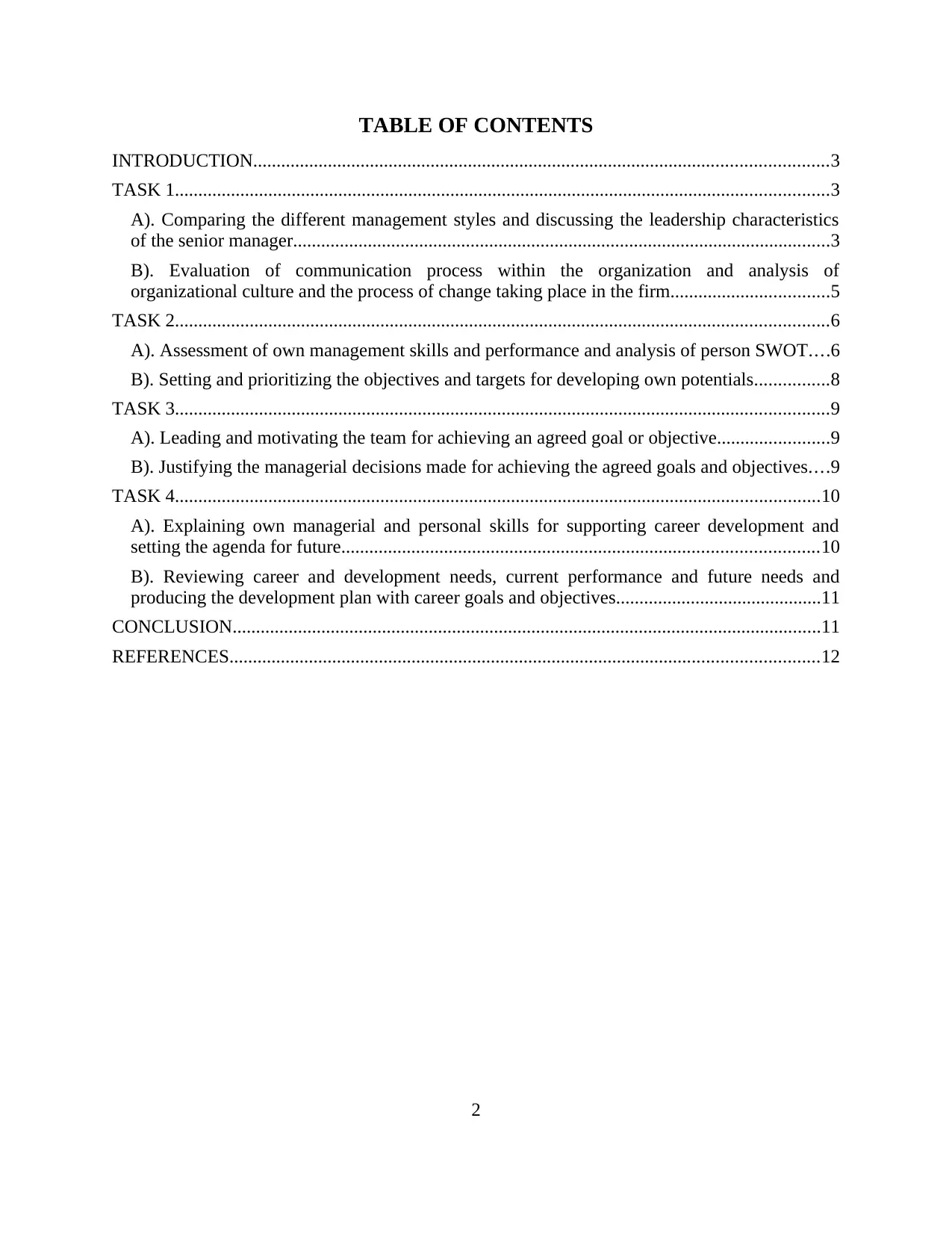
TABLE OF CONTENTS
INTRODUCTION...........................................................................................................................3
TASK 1............................................................................................................................................3
A). Comparing the different management styles and discussing the leadership characteristics
of the senior manager...................................................................................................................3
B). Evaluation of communication process within the organization and analysis of
organizational culture and the process of change taking place in the firm..................................5
TASK 2............................................................................................................................................6
A). Assessment of own management skills and performance and analysis of person SWOT....6
B). Setting and prioritizing the objectives and targets for developing own potentials................8
TASK 3............................................................................................................................................9
A). Leading and motivating the team for achieving an agreed goal or objective........................9
B). Justifying the managerial decisions made for achieving the agreed goals and objectives....9
TASK 4..........................................................................................................................................10
A). Explaining own managerial and personal skills for supporting career development and
setting the agenda for future......................................................................................................10
B). Reviewing career and development needs, current performance and future needs and
producing the development plan with career goals and objectives............................................11
CONCLUSION..............................................................................................................................11
REFERENCES..............................................................................................................................12
2
INTRODUCTION...........................................................................................................................3
TASK 1............................................................................................................................................3
A). Comparing the different management styles and discussing the leadership characteristics
of the senior manager...................................................................................................................3
B). Evaluation of communication process within the organization and analysis of
organizational culture and the process of change taking place in the firm..................................5
TASK 2............................................................................................................................................6
A). Assessment of own management skills and performance and analysis of person SWOT....6
B). Setting and prioritizing the objectives and targets for developing own potentials................8
TASK 3............................................................................................................................................9
A). Leading and motivating the team for achieving an agreed goal or objective........................9
B). Justifying the managerial decisions made for achieving the agreed goals and objectives....9
TASK 4..........................................................................................................................................10
A). Explaining own managerial and personal skills for supporting career development and
setting the agenda for future......................................................................................................10
B). Reviewing career and development needs, current performance and future needs and
producing the development plan with career goals and objectives............................................11
CONCLUSION..............................................................................................................................11
REFERENCES..............................................................................................................................12
2
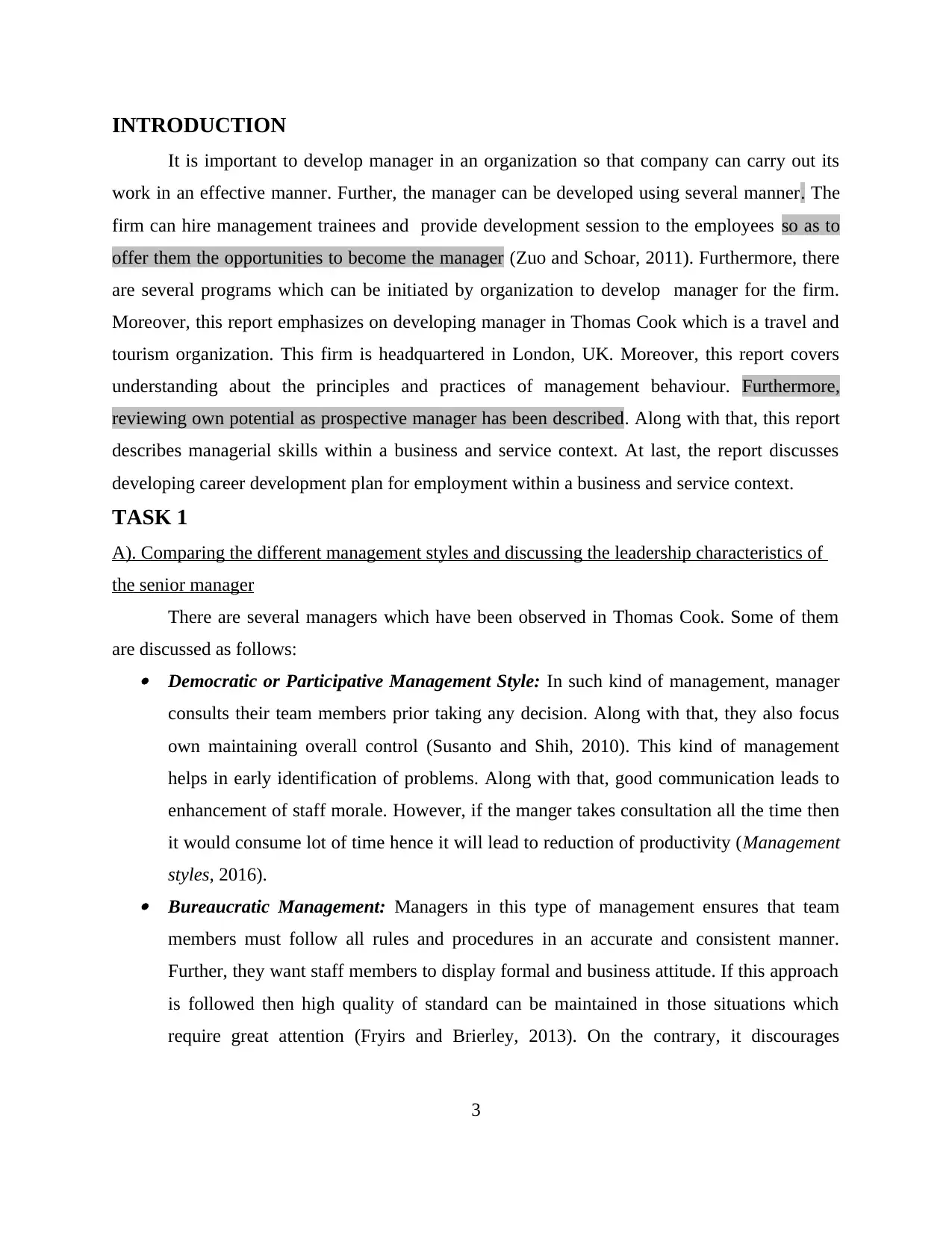
INTRODUCTION
It is important to develop manager in an organization so that company can carry out its
work in an effective manner. Further, the manager can be developed using several manner. The
firm can hire management trainees and provide development session to the employees so as to
offer them the opportunities to become the manager (Zuo and Schoar, 2011). Furthermore, there
are several programs which can be initiated by organization to develop manager for the firm.
Moreover, this report emphasizes on developing manager in Thomas Cook which is a travel and
tourism organization. This firm is headquartered in London, UK. Moreover, this report covers
understanding about the principles and practices of management behaviour. Furthermore,
reviewing own potential as prospective manager has been described. Along with that, this report
describes managerial skills within a business and service context. At last, the report discusses
developing career development plan for employment within a business and service context.
TASK 1
A). Comparing the different management styles and discussing the leadership characteristics of
the senior manager
There are several managers which have been observed in Thomas Cook. Some of them
are discussed as follows: Democratic or Participative Management Style: In such kind of management, manager
consults their team members prior taking any decision. Along with that, they also focus
own maintaining overall control (Susanto and Shih, 2010). This kind of management
helps in early identification of problems. Along with that, good communication leads to
enhancement of staff morale. However, if the manger takes consultation all the time then
it would consume lot of time hence it will lead to reduction of productivity (Management
styles, 2016). Bureaucratic Management: Managers in this type of management ensures that team
members must follow all rules and procedures in an accurate and consistent manner.
Further, they want staff members to display formal and business attitude. If this approach
is followed then high quality of standard can be maintained in those situations which
require great attention (Fryirs and Brierley, 2013). On the contrary, it discourages
3
It is important to develop manager in an organization so that company can carry out its
work in an effective manner. Further, the manager can be developed using several manner. The
firm can hire management trainees and provide development session to the employees so as to
offer them the opportunities to become the manager (Zuo and Schoar, 2011). Furthermore, there
are several programs which can be initiated by organization to develop manager for the firm.
Moreover, this report emphasizes on developing manager in Thomas Cook which is a travel and
tourism organization. This firm is headquartered in London, UK. Moreover, this report covers
understanding about the principles and practices of management behaviour. Furthermore,
reviewing own potential as prospective manager has been described. Along with that, this report
describes managerial skills within a business and service context. At last, the report discusses
developing career development plan for employment within a business and service context.
TASK 1
A). Comparing the different management styles and discussing the leadership characteristics of
the senior manager
There are several managers which have been observed in Thomas Cook. Some of them
are discussed as follows: Democratic or Participative Management Style: In such kind of management, manager
consults their team members prior taking any decision. Along with that, they also focus
own maintaining overall control (Susanto and Shih, 2010). This kind of management
helps in early identification of problems. Along with that, good communication leads to
enhancement of staff morale. However, if the manger takes consultation all the time then
it would consume lot of time hence it will lead to reduction of productivity (Management
styles, 2016). Bureaucratic Management: Managers in this type of management ensures that team
members must follow all rules and procedures in an accurate and consistent manner.
Further, they want staff members to display formal and business attitude. If this approach
is followed then high quality of standard can be maintained in those situations which
require great attention (Fryirs and Brierley, 2013). On the contrary, it discourages
3
⊘ This is a preview!⊘
Do you want full access?
Subscribe today to unlock all pages.

Trusted by 1+ million students worldwide
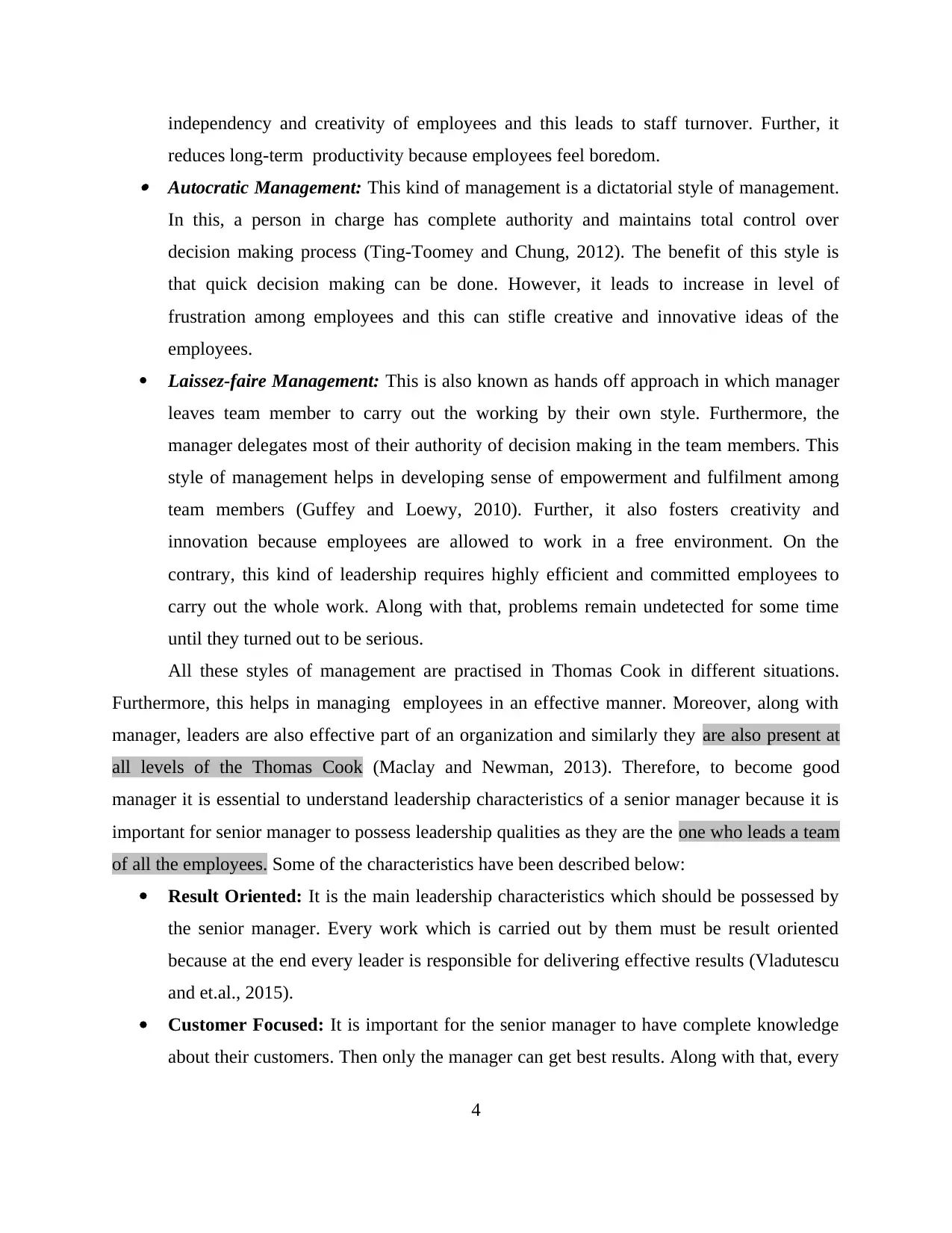
independency and creativity of employees and this leads to staff turnover. Further, it
reduces long-term productivity because employees feel boredom. Autocratic Management: This kind of management is a dictatorial style of management.
In this, a person in charge has complete authority and maintains total control over
decision making process (Ting-Toomey and Chung, 2012). The benefit of this style is
that quick decision making can be done. However, it leads to increase in level of
frustration among employees and this can stifle creative and innovative ideas of the
employees.
Laissez-faire Management: This is also known as hands off approach in which manager
leaves team member to carry out the working by their own style. Furthermore, the
manager delegates most of their authority of decision making in the team members. This
style of management helps in developing sense of empowerment and fulfilment among
team members (Guffey and Loewy, 2010). Further, it also fosters creativity and
innovation because employees are allowed to work in a free environment. On the
contrary, this kind of leadership requires highly efficient and committed employees to
carry out the whole work. Along with that, problems remain undetected for some time
until they turned out to be serious.
All these styles of management are practised in Thomas Cook in different situations.
Furthermore, this helps in managing employees in an effective manner. Moreover, along with
manager, leaders are also effective part of an organization and similarly they are also present at
all levels of the Thomas Cook (Maclay and Newman, 2013). Therefore, to become good
manager it is essential to understand leadership characteristics of a senior manager because it is
important for senior manager to possess leadership qualities as they are the one who leads a team
of all the employees. Some of the characteristics have been described below:
Result Oriented: It is the main leadership characteristics which should be possessed by
the senior manager. Every work which is carried out by them must be result oriented
because at the end every leader is responsible for delivering effective results (Vladutescu
and et.al., 2015).
Customer Focused: It is important for the senior manager to have complete knowledge
about their customers. Then only the manager can get best results. Along with that, every
4
reduces long-term productivity because employees feel boredom. Autocratic Management: This kind of management is a dictatorial style of management.
In this, a person in charge has complete authority and maintains total control over
decision making process (Ting-Toomey and Chung, 2012). The benefit of this style is
that quick decision making can be done. However, it leads to increase in level of
frustration among employees and this can stifle creative and innovative ideas of the
employees.
Laissez-faire Management: This is also known as hands off approach in which manager
leaves team member to carry out the working by their own style. Furthermore, the
manager delegates most of their authority of decision making in the team members. This
style of management helps in developing sense of empowerment and fulfilment among
team members (Guffey and Loewy, 2010). Further, it also fosters creativity and
innovation because employees are allowed to work in a free environment. On the
contrary, this kind of leadership requires highly efficient and committed employees to
carry out the whole work. Along with that, problems remain undetected for some time
until they turned out to be serious.
All these styles of management are practised in Thomas Cook in different situations.
Furthermore, this helps in managing employees in an effective manner. Moreover, along with
manager, leaders are also effective part of an organization and similarly they are also present at
all levels of the Thomas Cook (Maclay and Newman, 2013). Therefore, to become good
manager it is essential to understand leadership characteristics of a senior manager because it is
important for senior manager to possess leadership qualities as they are the one who leads a team
of all the employees. Some of the characteristics have been described below:
Result Oriented: It is the main leadership characteristics which should be possessed by
the senior manager. Every work which is carried out by them must be result oriented
because at the end every leader is responsible for delivering effective results (Vladutescu
and et.al., 2015).
Customer Focused: It is important for the senior manager to have complete knowledge
about their customers. Then only the manager can get best results. Along with that, every
4
Paraphrase This Document
Need a fresh take? Get an instant paraphrase of this document with our AI Paraphraser
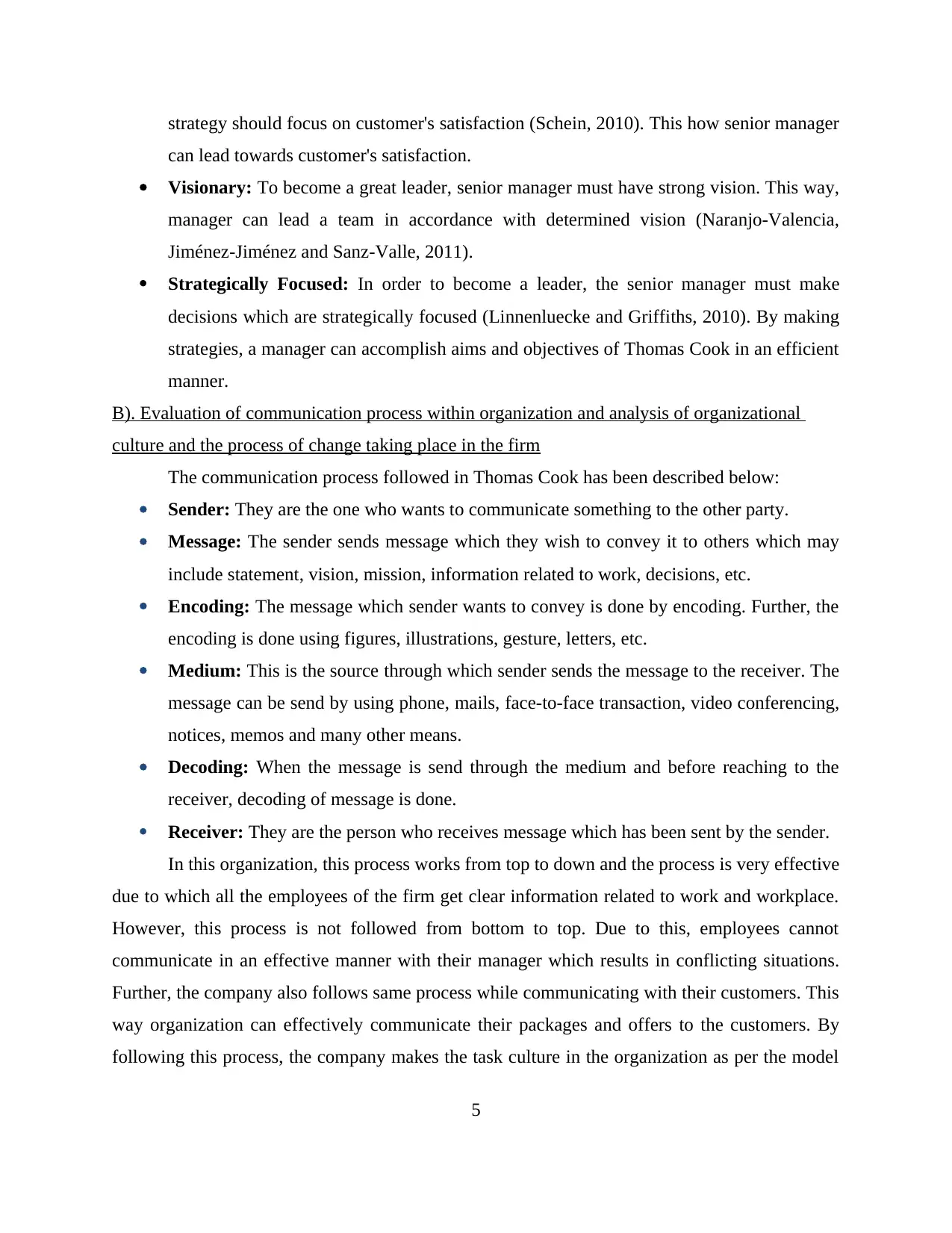
strategy should focus on customer's satisfaction (Schein, 2010). This how senior manager
can lead towards customer's satisfaction.
Visionary: To become a great leader, senior manager must have strong vision. This way,
manager can lead a team in accordance with determined vision (Naranjo-Valencia,
Jiménez-Jiménez and Sanz-Valle, 2011).
Strategically Focused: In order to become a leader, the senior manager must make
decisions which are strategically focused (Linnenluecke and Griffiths, 2010). By making
strategies, a manager can accomplish aims and objectives of Thomas Cook in an efficient
manner.
B). Evaluation of communication process within organization and analysis of organizational
culture and the process of change taking place in the firm
The communication process followed in Thomas Cook has been described below:
Sender: They are the one who wants to communicate something to the other party.
Message: The sender sends message which they wish to convey it to others which may
include statement, vision, mission, information related to work, decisions, etc.
Encoding: The message which sender wants to convey is done by encoding. Further, the
encoding is done using figures, illustrations, gesture, letters, etc.
Medium: This is the source through which sender sends the message to the receiver. The
message can be send by using phone, mails, face-to-face transaction, video conferencing,
notices, memos and many other means.
Decoding: When the message is send through the medium and before reaching to the
receiver, decoding of message is done.
Receiver: They are the person who receives message which has been sent by the sender.
In this organization, this process works from top to down and the process is very effective
due to which all the employees of the firm get clear information related to work and workplace.
However, this process is not followed from bottom to top. Due to this, employees cannot
communicate in an effective manner with their manager which results in conflicting situations.
Further, the company also follows same process while communicating with their customers. This
way organization can effectively communicate their packages and offers to the customers. By
following this process, the company makes the task culture in the organization as per the model
5
can lead towards customer's satisfaction.
Visionary: To become a great leader, senior manager must have strong vision. This way,
manager can lead a team in accordance with determined vision (Naranjo-Valencia,
Jiménez-Jiménez and Sanz-Valle, 2011).
Strategically Focused: In order to become a leader, the senior manager must make
decisions which are strategically focused (Linnenluecke and Griffiths, 2010). By making
strategies, a manager can accomplish aims and objectives of Thomas Cook in an efficient
manner.
B). Evaluation of communication process within organization and analysis of organizational
culture and the process of change taking place in the firm
The communication process followed in Thomas Cook has been described below:
Sender: They are the one who wants to communicate something to the other party.
Message: The sender sends message which they wish to convey it to others which may
include statement, vision, mission, information related to work, decisions, etc.
Encoding: The message which sender wants to convey is done by encoding. Further, the
encoding is done using figures, illustrations, gesture, letters, etc.
Medium: This is the source through which sender sends the message to the receiver. The
message can be send by using phone, mails, face-to-face transaction, video conferencing,
notices, memos and many other means.
Decoding: When the message is send through the medium and before reaching to the
receiver, decoding of message is done.
Receiver: They are the person who receives message which has been sent by the sender.
In this organization, this process works from top to down and the process is very effective
due to which all the employees of the firm get clear information related to work and workplace.
However, this process is not followed from bottom to top. Due to this, employees cannot
communicate in an effective manner with their manager which results in conflicting situations.
Further, the company also follows same process while communicating with their customers. This
way organization can effectively communicate their packages and offers to the customers. By
following this process, the company makes the task culture in the organization as per the model
5
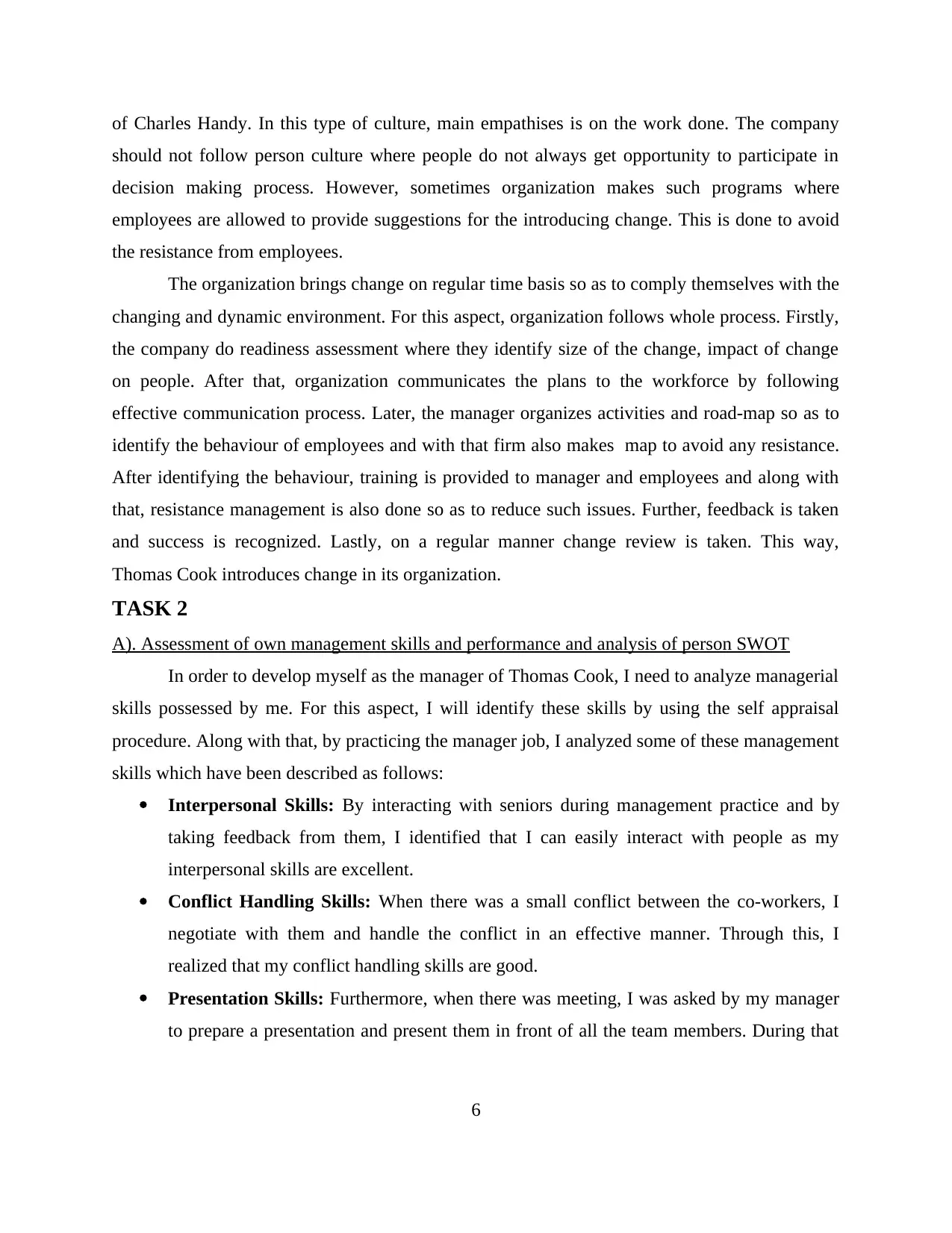
of Charles Handy. In this type of culture, main empathises is on the work done. The company
should not follow person culture where people do not always get opportunity to participate in
decision making process. However, sometimes organization makes such programs where
employees are allowed to provide suggestions for the introducing change. This is done to avoid
the resistance from employees.
The organization brings change on regular time basis so as to comply themselves with the
changing and dynamic environment. For this aspect, organization follows whole process. Firstly,
the company do readiness assessment where they identify size of the change, impact of change
on people. After that, organization communicates the plans to the workforce by following
effective communication process. Later, the manager organizes activities and road-map so as to
identify the behaviour of employees and with that firm also makes map to avoid any resistance.
After identifying the behaviour, training is provided to manager and employees and along with
that, resistance management is also done so as to reduce such issues. Further, feedback is taken
and success is recognized. Lastly, on a regular manner change review is taken. This way,
Thomas Cook introduces change in its organization.
TASK 2
A). Assessment of own management skills and performance and analysis of person SWOT
In order to develop myself as the manager of Thomas Cook, I need to analyze managerial
skills possessed by me. For this aspect, I will identify these skills by using the self appraisal
procedure. Along with that, by practicing the manager job, I analyzed some of these management
skills which have been described as follows:
Interpersonal Skills: By interacting with seniors during management practice and by
taking feedback from them, I identified that I can easily interact with people as my
interpersonal skills are excellent.
Conflict Handling Skills: When there was a small conflict between the co-workers, I
negotiate with them and handle the conflict in an effective manner. Through this, I
realized that my conflict handling skills are good.
Presentation Skills: Furthermore, when there was meeting, I was asked by my manager
to prepare a presentation and present them in front of all the team members. During that
6
should not follow person culture where people do not always get opportunity to participate in
decision making process. However, sometimes organization makes such programs where
employees are allowed to provide suggestions for the introducing change. This is done to avoid
the resistance from employees.
The organization brings change on regular time basis so as to comply themselves with the
changing and dynamic environment. For this aspect, organization follows whole process. Firstly,
the company do readiness assessment where they identify size of the change, impact of change
on people. After that, organization communicates the plans to the workforce by following
effective communication process. Later, the manager organizes activities and road-map so as to
identify the behaviour of employees and with that firm also makes map to avoid any resistance.
After identifying the behaviour, training is provided to manager and employees and along with
that, resistance management is also done so as to reduce such issues. Further, feedback is taken
and success is recognized. Lastly, on a regular manner change review is taken. This way,
Thomas Cook introduces change in its organization.
TASK 2
A). Assessment of own management skills and performance and analysis of person SWOT
In order to develop myself as the manager of Thomas Cook, I need to analyze managerial
skills possessed by me. For this aspect, I will identify these skills by using the self appraisal
procedure. Along with that, by practicing the manager job, I analyzed some of these management
skills which have been described as follows:
Interpersonal Skills: By interacting with seniors during management practice and by
taking feedback from them, I identified that I can easily interact with people as my
interpersonal skills are excellent.
Conflict Handling Skills: When there was a small conflict between the co-workers, I
negotiate with them and handle the conflict in an effective manner. Through this, I
realized that my conflict handling skills are good.
Presentation Skills: Furthermore, when there was meeting, I was asked by my manager
to prepare a presentation and present them in front of all the team members. During that
6
⊘ This is a preview!⊘
Do you want full access?
Subscribe today to unlock all pages.

Trusted by 1+ million students worldwide
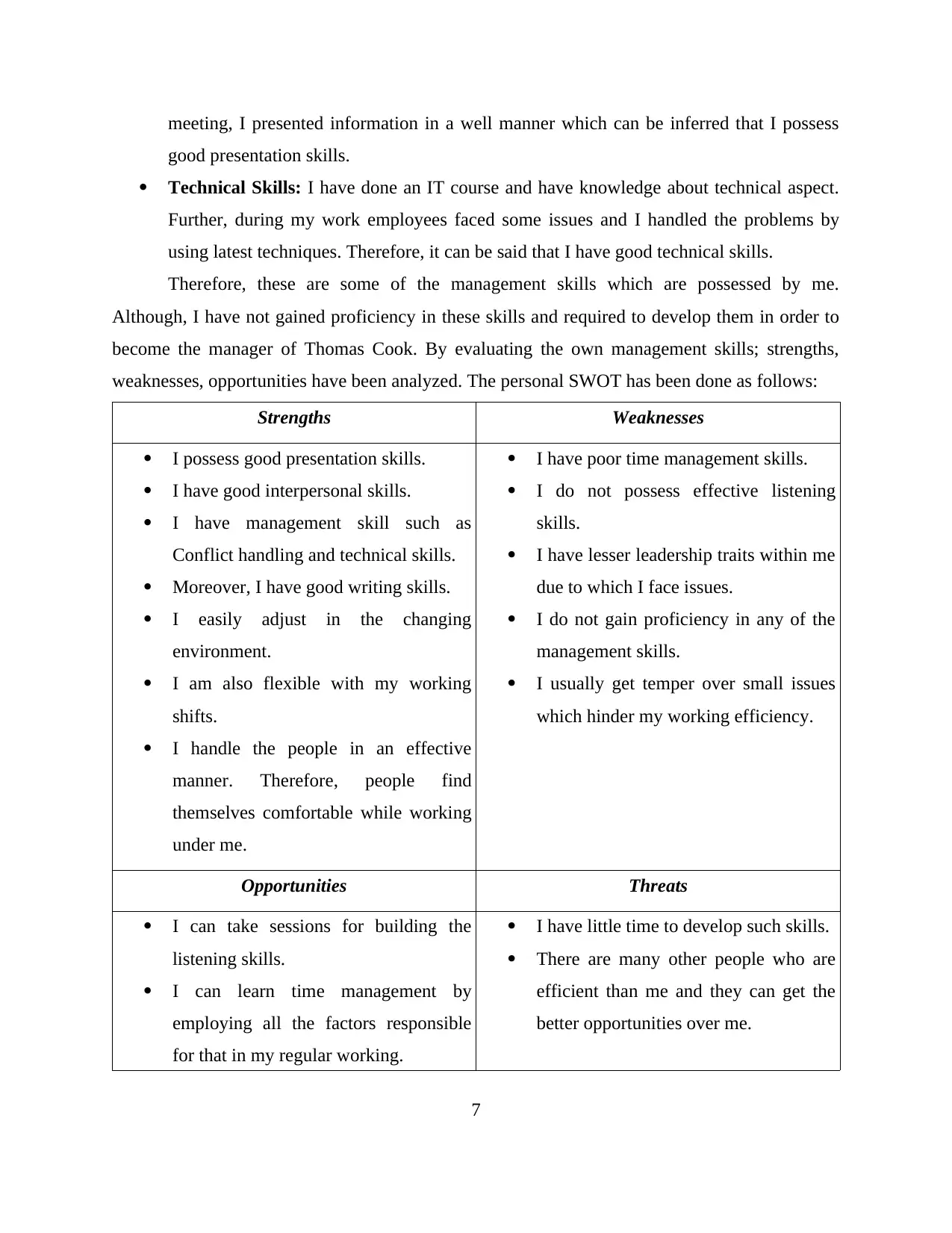
meeting, I presented information in a well manner which can be inferred that I possess
good presentation skills.
Technical Skills: I have done an IT course and have knowledge about technical aspect.
Further, during my work employees faced some issues and I handled the problems by
using latest techniques. Therefore, it can be said that I have good technical skills.
Therefore, these are some of the management skills which are possessed by me.
Although, I have not gained proficiency in these skills and required to develop them in order to
become the manager of Thomas Cook. By evaluating the own management skills; strengths,
weaknesses, opportunities have been analyzed. The personal SWOT has been done as follows:
Strengths Weaknesses
I possess good presentation skills.
I have good interpersonal skills.
I have management skill such as
Conflict handling and technical skills.
Moreover, I have good writing skills.
I easily adjust in the changing
environment.
I am also flexible with my working
shifts.
I handle the people in an effective
manner. Therefore, people find
themselves comfortable while working
under me.
I have poor time management skills.
I do not possess effective listening
skills.
I have lesser leadership traits within me
due to which I face issues.
I do not gain proficiency in any of the
management skills.
I usually get temper over small issues
which hinder my working efficiency.
Opportunities Threats
I can take sessions for building the
listening skills.
I can learn time management by
employing all the factors responsible
for that in my regular working.
I have little time to develop such skills.
There are many other people who are
efficient than me and they can get the
better opportunities over me.
7
good presentation skills.
Technical Skills: I have done an IT course and have knowledge about technical aspect.
Further, during my work employees faced some issues and I handled the problems by
using latest techniques. Therefore, it can be said that I have good technical skills.
Therefore, these are some of the management skills which are possessed by me.
Although, I have not gained proficiency in these skills and required to develop them in order to
become the manager of Thomas Cook. By evaluating the own management skills; strengths,
weaknesses, opportunities have been analyzed. The personal SWOT has been done as follows:
Strengths Weaknesses
I possess good presentation skills.
I have good interpersonal skills.
I have management skill such as
Conflict handling and technical skills.
Moreover, I have good writing skills.
I easily adjust in the changing
environment.
I am also flexible with my working
shifts.
I handle the people in an effective
manner. Therefore, people find
themselves comfortable while working
under me.
I have poor time management skills.
I do not possess effective listening
skills.
I have lesser leadership traits within me
due to which I face issues.
I do not gain proficiency in any of the
management skills.
I usually get temper over small issues
which hinder my working efficiency.
Opportunities Threats
I can take sessions for building the
listening skills.
I can learn time management by
employing all the factors responsible
for that in my regular working.
I have little time to develop such skills.
There are many other people who are
efficient than me and they can get the
better opportunities over me.
7
Paraphrase This Document
Need a fresh take? Get an instant paraphrase of this document with our AI Paraphraser
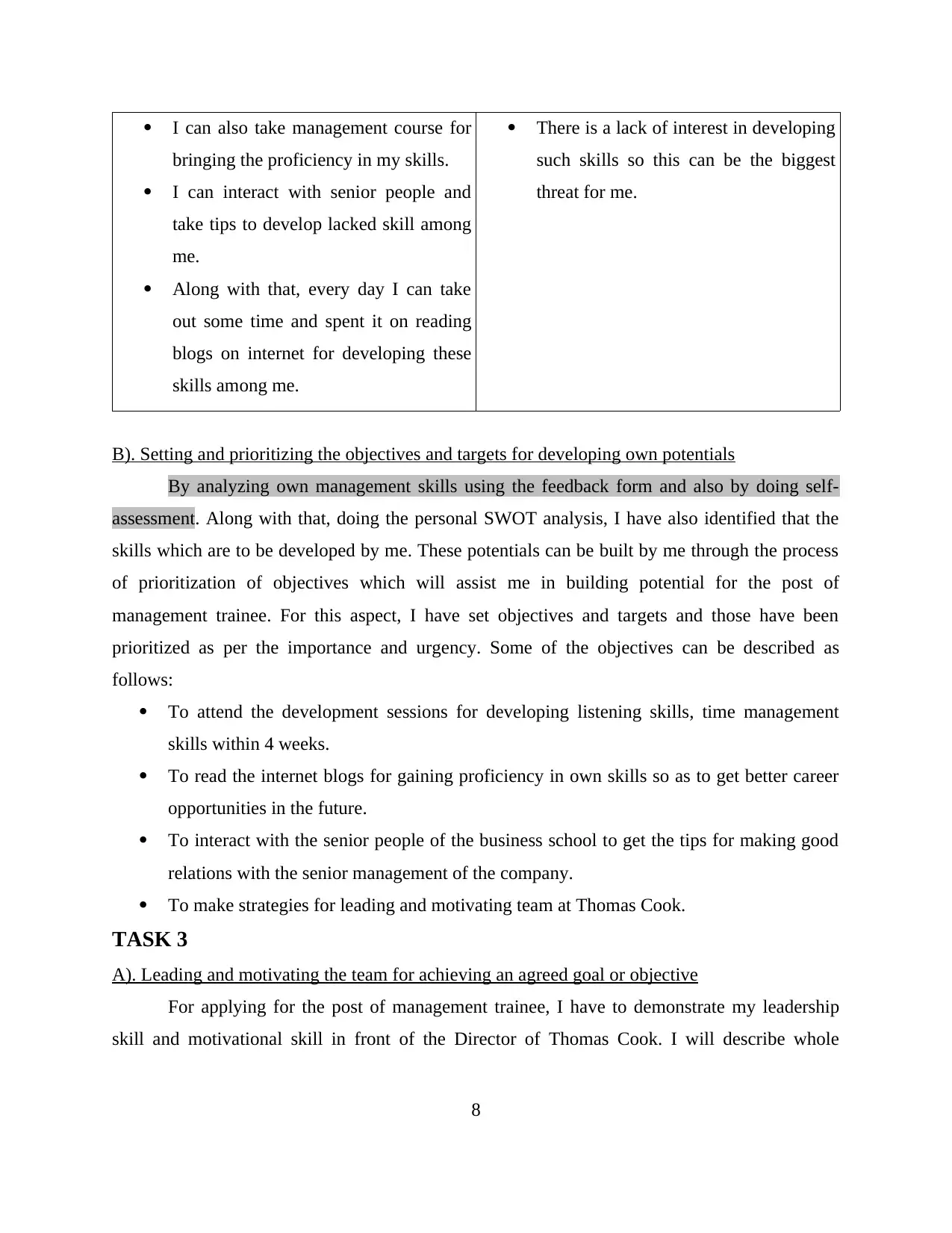
I can also take management course for
bringing the proficiency in my skills.
I can interact with senior people and
take tips to develop lacked skill among
me.
Along with that, every day I can take
out some time and spent it on reading
blogs on internet for developing these
skills among me.
There is a lack of interest in developing
such skills so this can be the biggest
threat for me.
B). Setting and prioritizing the objectives and targets for developing own potentials
By analyzing own management skills using the feedback form and also by doing self-
assessment. Along with that, doing the personal SWOT analysis, I have also identified that the
skills which are to be developed by me. These potentials can be built by me through the process
of prioritization of objectives which will assist me in building potential for the post of
management trainee. For this aspect, I have set objectives and targets and those have been
prioritized as per the importance and urgency. Some of the objectives can be described as
follows:
To attend the development sessions for developing listening skills, time management
skills within 4 weeks.
To read the internet blogs for gaining proficiency in own skills so as to get better career
opportunities in the future.
To interact with the senior people of the business school to get the tips for making good
relations with the senior management of the company.
To make strategies for leading and motivating team at Thomas Cook.
TASK 3
A). Leading and motivating the team for achieving an agreed goal or objective
For applying for the post of management trainee, I have to demonstrate my leadership
skill and motivational skill in front of the Director of Thomas Cook. I will describe whole
8
bringing the proficiency in my skills.
I can interact with senior people and
take tips to develop lacked skill among
me.
Along with that, every day I can take
out some time and spent it on reading
blogs on internet for developing these
skills among me.
There is a lack of interest in developing
such skills so this can be the biggest
threat for me.
B). Setting and prioritizing the objectives and targets for developing own potentials
By analyzing own management skills using the feedback form and also by doing self-
assessment. Along with that, doing the personal SWOT analysis, I have also identified that the
skills which are to be developed by me. These potentials can be built by me through the process
of prioritization of objectives which will assist me in building potential for the post of
management trainee. For this aspect, I have set objectives and targets and those have been
prioritized as per the importance and urgency. Some of the objectives can be described as
follows:
To attend the development sessions for developing listening skills, time management
skills within 4 weeks.
To read the internet blogs for gaining proficiency in own skills so as to get better career
opportunities in the future.
To interact with the senior people of the business school to get the tips for making good
relations with the senior management of the company.
To make strategies for leading and motivating team at Thomas Cook.
TASK 3
A). Leading and motivating the team for achieving an agreed goal or objective
For applying for the post of management trainee, I have to demonstrate my leadership
skill and motivational skill in front of the Director of Thomas Cook. I will describe whole
8
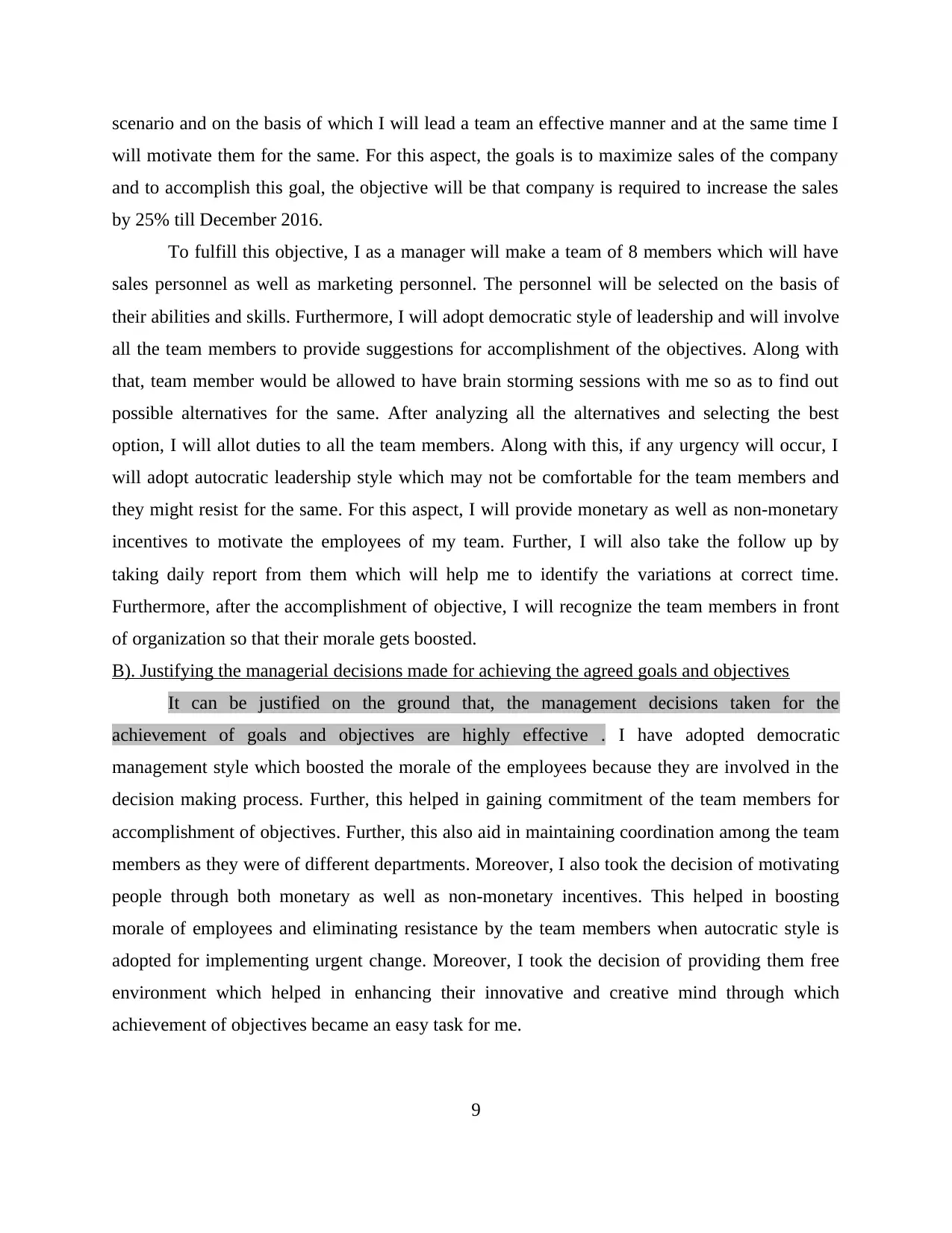
scenario and on the basis of which I will lead a team an effective manner and at the same time I
will motivate them for the same. For this aspect, the goals is to maximize sales of the company
and to accomplish this goal, the objective will be that company is required to increase the sales
by 25% till December 2016.
To fulfill this objective, I as a manager will make a team of 8 members which will have
sales personnel as well as marketing personnel. The personnel will be selected on the basis of
their abilities and skills. Furthermore, I will adopt democratic style of leadership and will involve
all the team members to provide suggestions for accomplishment of the objectives. Along with
that, team member would be allowed to have brain storming sessions with me so as to find out
possible alternatives for the same. After analyzing all the alternatives and selecting the best
option, I will allot duties to all the team members. Along with this, if any urgency will occur, I
will adopt autocratic leadership style which may not be comfortable for the team members and
they might resist for the same. For this aspect, I will provide monetary as well as non-monetary
incentives to motivate the employees of my team. Further, I will also take the follow up by
taking daily report from them which will help me to identify the variations at correct time.
Furthermore, after the accomplishment of objective, I will recognize the team members in front
of organization so that their morale gets boosted.
B). Justifying the managerial decisions made for achieving the agreed goals and objectives
It can be justified on the ground that, the management decisions taken for the
achievement of goals and objectives are highly effective . I have adopted democratic
management style which boosted the morale of the employees because they are involved in the
decision making process. Further, this helped in gaining commitment of the team members for
accomplishment of objectives. Further, this also aid in maintaining coordination among the team
members as they were of different departments. Moreover, I also took the decision of motivating
people through both monetary as well as non-monetary incentives. This helped in boosting
morale of employees and eliminating resistance by the team members when autocratic style is
adopted for implementing urgent change. Moreover, I took the decision of providing them free
environment which helped in enhancing their innovative and creative mind through which
achievement of objectives became an easy task for me.
9
will motivate them for the same. For this aspect, the goals is to maximize sales of the company
and to accomplish this goal, the objective will be that company is required to increase the sales
by 25% till December 2016.
To fulfill this objective, I as a manager will make a team of 8 members which will have
sales personnel as well as marketing personnel. The personnel will be selected on the basis of
their abilities and skills. Furthermore, I will adopt democratic style of leadership and will involve
all the team members to provide suggestions for accomplishment of the objectives. Along with
that, team member would be allowed to have brain storming sessions with me so as to find out
possible alternatives for the same. After analyzing all the alternatives and selecting the best
option, I will allot duties to all the team members. Along with this, if any urgency will occur, I
will adopt autocratic leadership style which may not be comfortable for the team members and
they might resist for the same. For this aspect, I will provide monetary as well as non-monetary
incentives to motivate the employees of my team. Further, I will also take the follow up by
taking daily report from them which will help me to identify the variations at correct time.
Furthermore, after the accomplishment of objective, I will recognize the team members in front
of organization so that their morale gets boosted.
B). Justifying the managerial decisions made for achieving the agreed goals and objectives
It can be justified on the ground that, the management decisions taken for the
achievement of goals and objectives are highly effective . I have adopted democratic
management style which boosted the morale of the employees because they are involved in the
decision making process. Further, this helped in gaining commitment of the team members for
accomplishment of objectives. Further, this also aid in maintaining coordination among the team
members as they were of different departments. Moreover, I also took the decision of motivating
people through both monetary as well as non-monetary incentives. This helped in boosting
morale of employees and eliminating resistance by the team members when autocratic style is
adopted for implementing urgent change. Moreover, I took the decision of providing them free
environment which helped in enhancing their innovative and creative mind through which
achievement of objectives became an easy task for me.
9
⊘ This is a preview!⊘
Do you want full access?
Subscribe today to unlock all pages.

Trusted by 1+ million students worldwide
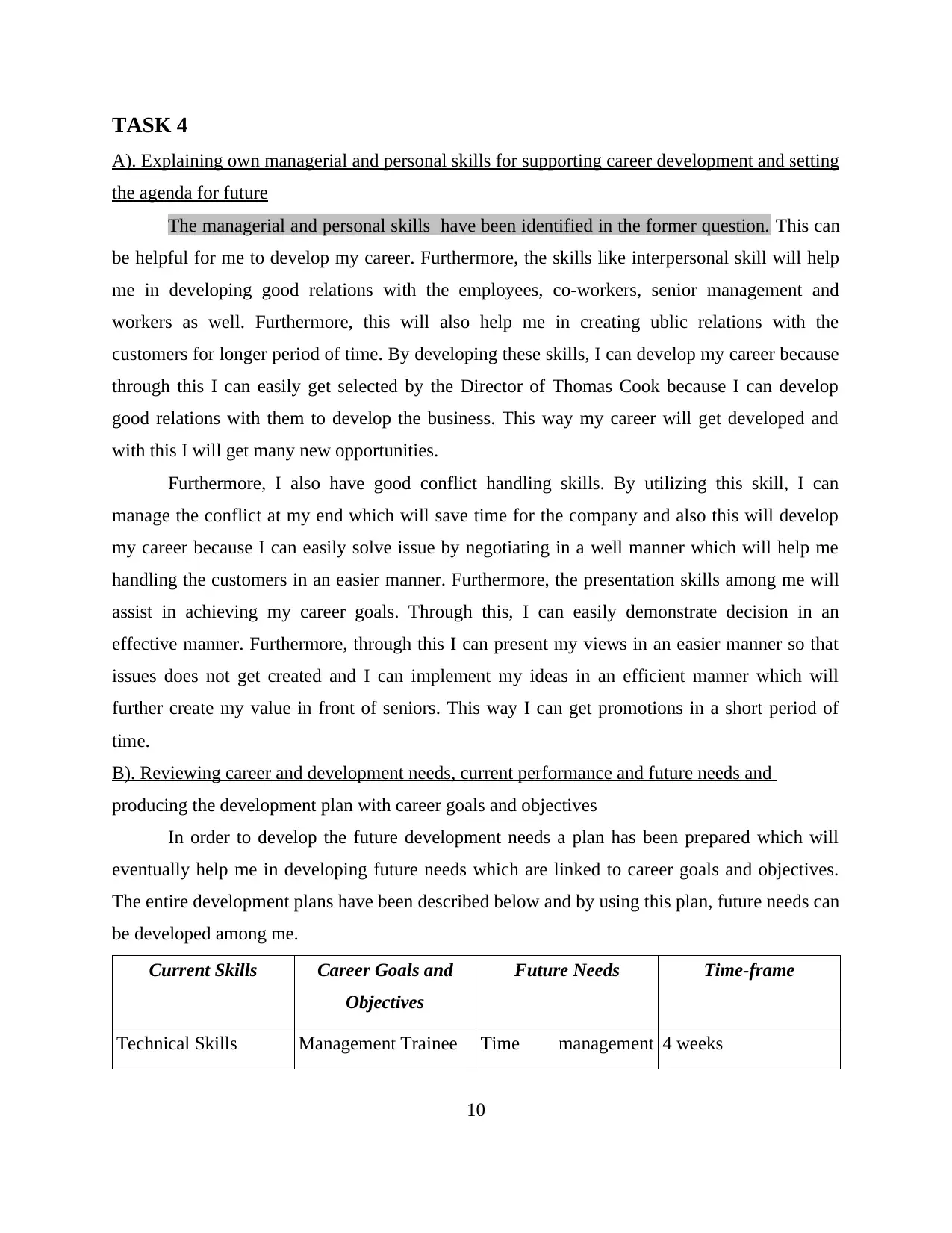
TASK 4
A). Explaining own managerial and personal skills for supporting career development and setting
the agenda for future
The managerial and personal skills have been identified in the former question. This can
be helpful for me to develop my career. Furthermore, the skills like interpersonal skill will help
me in developing good relations with the employees, co-workers, senior management and
workers as well. Furthermore, this will also help me in creating ublic relations with the
customers for longer period of time. By developing these skills, I can develop my career because
through this I can easily get selected by the Director of Thomas Cook because I can develop
good relations with them to develop the business. This way my career will get developed and
with this I will get many new opportunities.
Furthermore, I also have good conflict handling skills. By utilizing this skill, I can
manage the conflict at my end which will save time for the company and also this will develop
my career because I can easily solve issue by negotiating in a well manner which will help me
handling the customers in an easier manner. Furthermore, the presentation skills among me will
assist in achieving my career goals. Through this, I can easily demonstrate decision in an
effective manner. Furthermore, through this I can present my views in an easier manner so that
issues does not get created and I can implement my ideas in an efficient manner which will
further create my value in front of seniors. This way I can get promotions in a short period of
time.
B). Reviewing career and development needs, current performance and future needs and
producing the development plan with career goals and objectives
In order to develop the future development needs a plan has been prepared which will
eventually help me in developing future needs which are linked to career goals and objectives.
The entire development plans have been described below and by using this plan, future needs can
be developed among me.
Current Skills Career Goals and
Objectives
Future Needs Time-frame
Technical Skills Management Trainee Time management 4 weeks
10
A). Explaining own managerial and personal skills for supporting career development and setting
the agenda for future
The managerial and personal skills have been identified in the former question. This can
be helpful for me to develop my career. Furthermore, the skills like interpersonal skill will help
me in developing good relations with the employees, co-workers, senior management and
workers as well. Furthermore, this will also help me in creating ublic relations with the
customers for longer period of time. By developing these skills, I can develop my career because
through this I can easily get selected by the Director of Thomas Cook because I can develop
good relations with them to develop the business. This way my career will get developed and
with this I will get many new opportunities.
Furthermore, I also have good conflict handling skills. By utilizing this skill, I can
manage the conflict at my end which will save time for the company and also this will develop
my career because I can easily solve issue by negotiating in a well manner which will help me
handling the customers in an easier manner. Furthermore, the presentation skills among me will
assist in achieving my career goals. Through this, I can easily demonstrate decision in an
effective manner. Furthermore, through this I can present my views in an easier manner so that
issues does not get created and I can implement my ideas in an efficient manner which will
further create my value in front of seniors. This way I can get promotions in a short period of
time.
B). Reviewing career and development needs, current performance and future needs and
producing the development plan with career goals and objectives
In order to develop the future development needs a plan has been prepared which will
eventually help me in developing future needs which are linked to career goals and objectives.
The entire development plans have been described below and by using this plan, future needs can
be developed among me.
Current Skills Career Goals and
Objectives
Future Needs Time-frame
Technical Skills Management Trainee Time management 4 weeks
10
Paraphrase This Document
Need a fresh take? Get an instant paraphrase of this document with our AI Paraphraser
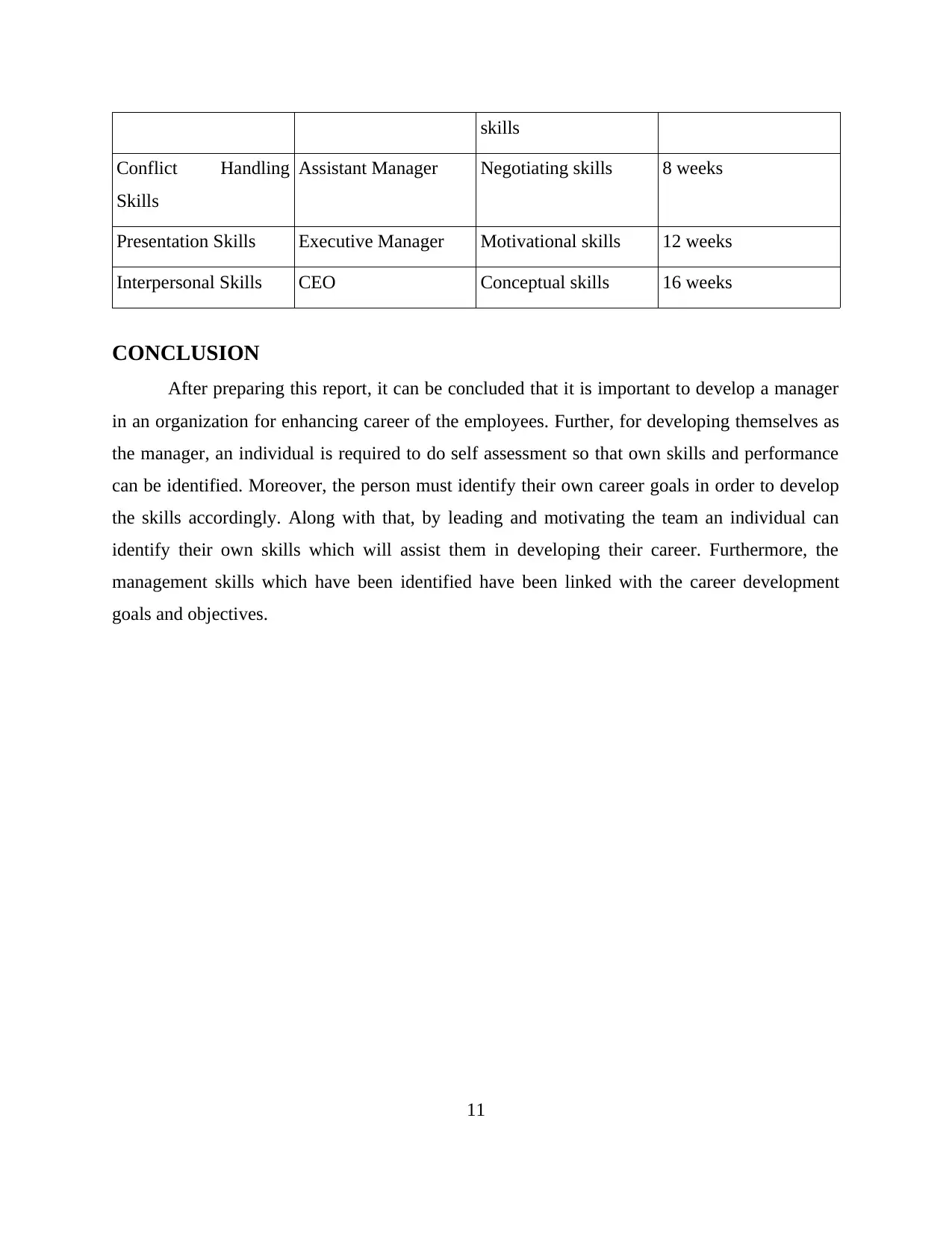
skills
Conflict Handling
Skills
Assistant Manager Negotiating skills 8 weeks
Presentation Skills Executive Manager Motivational skills 12 weeks
Interpersonal Skills CEO Conceptual skills 16 weeks
CONCLUSION
After preparing this report, it can be concluded that it is important to develop a manager
in an organization for enhancing career of the employees. Further, for developing themselves as
the manager, an individual is required to do self assessment so that own skills and performance
can be identified. Moreover, the person must identify their own career goals in order to develop
the skills accordingly. Along with that, by leading and motivating the team an individual can
identify their own skills which will assist them in developing their career. Furthermore, the
management skills which have been identified have been linked with the career development
goals and objectives.
11
Conflict Handling
Skills
Assistant Manager Negotiating skills 8 weeks
Presentation Skills Executive Manager Motivational skills 12 weeks
Interpersonal Skills CEO Conceptual skills 16 weeks
CONCLUSION
After preparing this report, it can be concluded that it is important to develop a manager
in an organization for enhancing career of the employees. Further, for developing themselves as
the manager, an individual is required to do self assessment so that own skills and performance
can be identified. Moreover, the person must identify their own career goals in order to develop
the skills accordingly. Along with that, by leading and motivating the team an individual can
identify their own skills which will assist them in developing their career. Furthermore, the
management skills which have been identified have been linked with the career development
goals and objectives.
11
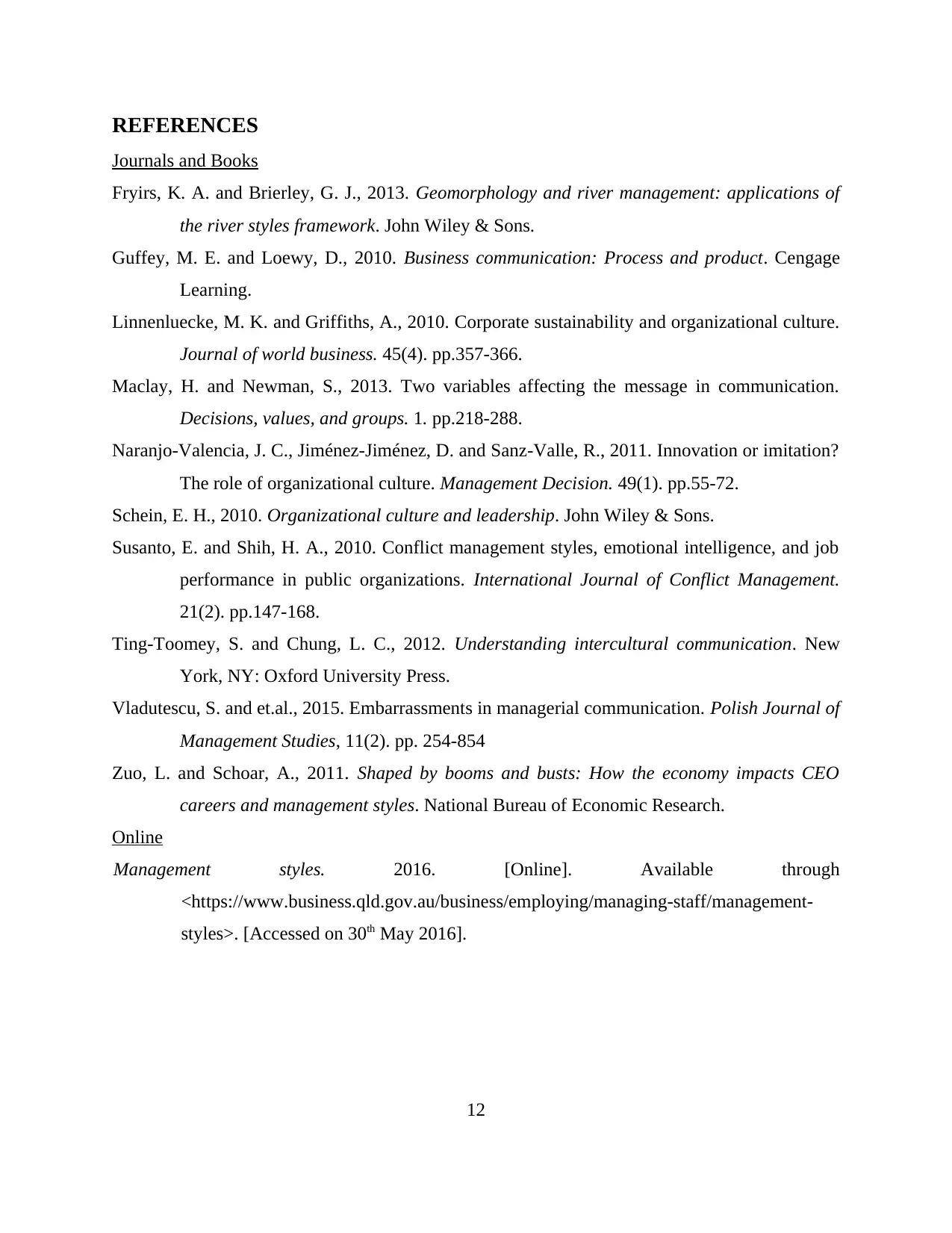
REFERENCES
Journals and Books
Fryirs, K. A. and Brierley, G. J., 2013. Geomorphology and river management: applications of
the river styles framework. John Wiley & Sons.
Guffey, M. E. and Loewy, D., 2010. Business communication: Process and product. Cengage
Learning.
Linnenluecke, M. K. and Griffiths, A., 2010. Corporate sustainability and organizational culture.
Journal of world business. 45(4). pp.357-366.
Maclay, H. and Newman, S., 2013. Two variables affecting the message in communication.
Decisions, values, and groups. 1. pp.218-288.
Naranjo-Valencia, J. C., Jiménez-Jiménez, D. and Sanz-Valle, R., 2011. Innovation or imitation?
The role of organizational culture. Management Decision. 49(1). pp.55-72.
Schein, E. H., 2010. Organizational culture and leadership. John Wiley & Sons.
Susanto, E. and Shih, H. A., 2010. Conflict management styles, emotional intelligence, and job
performance in public organizations. International Journal of Conflict Management.
21(2). pp.147-168.
Ting-Toomey, S. and Chung, L. C., 2012. Understanding intercultural communication. New
York, NY: Oxford University Press.
Vladutescu, S. and et.al., 2015. Embarrassments in managerial communication. Polish Journal of
Management Studies, 11(2). pp. 254-854
Zuo, L. and Schoar, A., 2011. Shaped by booms and busts: How the economy impacts CEO
careers and management styles. National Bureau of Economic Research.
Online
Management styles. 2016. [Online]. Available through
<https://www.business.qld.gov.au/business/employing/managing-staff/management-
styles>. [Accessed on 30th May 2016].
12
Journals and Books
Fryirs, K. A. and Brierley, G. J., 2013. Geomorphology and river management: applications of
the river styles framework. John Wiley & Sons.
Guffey, M. E. and Loewy, D., 2010. Business communication: Process and product. Cengage
Learning.
Linnenluecke, M. K. and Griffiths, A., 2010. Corporate sustainability and organizational culture.
Journal of world business. 45(4). pp.357-366.
Maclay, H. and Newman, S., 2013. Two variables affecting the message in communication.
Decisions, values, and groups. 1. pp.218-288.
Naranjo-Valencia, J. C., Jiménez-Jiménez, D. and Sanz-Valle, R., 2011. Innovation or imitation?
The role of organizational culture. Management Decision. 49(1). pp.55-72.
Schein, E. H., 2010. Organizational culture and leadership. John Wiley & Sons.
Susanto, E. and Shih, H. A., 2010. Conflict management styles, emotional intelligence, and job
performance in public organizations. International Journal of Conflict Management.
21(2). pp.147-168.
Ting-Toomey, S. and Chung, L. C., 2012. Understanding intercultural communication. New
York, NY: Oxford University Press.
Vladutescu, S. and et.al., 2015. Embarrassments in managerial communication. Polish Journal of
Management Studies, 11(2). pp. 254-854
Zuo, L. and Schoar, A., 2011. Shaped by booms and busts: How the economy impacts CEO
careers and management styles. National Bureau of Economic Research.
Online
Management styles. 2016. [Online]. Available through
<https://www.business.qld.gov.au/business/employing/managing-staff/management-
styles>. [Accessed on 30th May 2016].
12
⊘ This is a preview!⊘
Do you want full access?
Subscribe today to unlock all pages.

Trusted by 1+ million students worldwide
1 out of 12
Related Documents
Your All-in-One AI-Powered Toolkit for Academic Success.
+13062052269
info@desklib.com
Available 24*7 on WhatsApp / Email
![[object Object]](/_next/static/media/star-bottom.7253800d.svg)
Unlock your academic potential
Copyright © 2020–2026 A2Z Services. All Rights Reserved. Developed and managed by ZUCOL.





